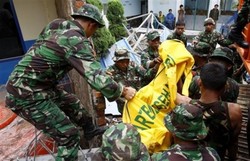The Savior Strategy

The crisis in Indonesia following a recent earthquake presents a critical opportunity for the international community to win "hearts and minds." Of course, these "hearts and minds" are probably not viewed as immediately strategically important by various heads of state, because there is no current level of actively aggressive military engagement in the region; however, smart public diplomacy is based on confidence-building initiatives that take place during peace time as well as war time.
Public diplomacy built on the ethos of humanitarianism has already been proven as an effective means to gain global trust. For example, immigration trends toward the United States have for decades reflected a belief by people worldwide that the U.S. was the "promised land." Moreover, effective public diplomacy comes with many other attractive "soft power" benefits.
And the public diplomacy benefits to be reaped from a successful relief effort in Indonesia are likely quite large. After a tsunami struck Indonesia's coast in 2005, a Pew Research Center report discovered a 25-point jump in public support for the United States following U.S.-led relief efforts.
This situation -- along with others similar -- readily present the opportunity to save lives and win hearts and minds in the process. This is the Savior Strategy, a global security and public diplomacy strategy for a world increasingly wracked by natural disasters. Perhaps most importantly though, for these public diplomacy gains to be sustainable, they must be viewed as strategically ancillary to the genuine primary goal of providing effective relief to the victims of natural disasters.





